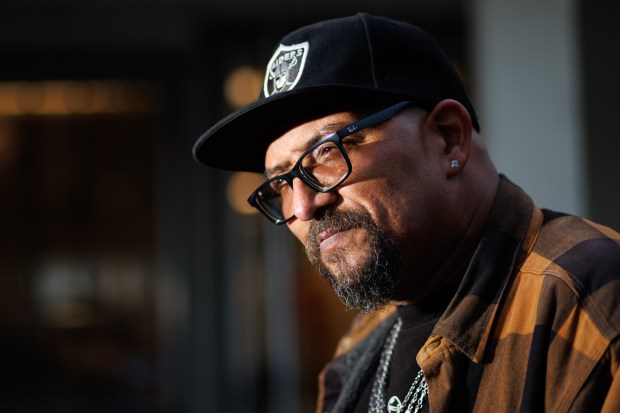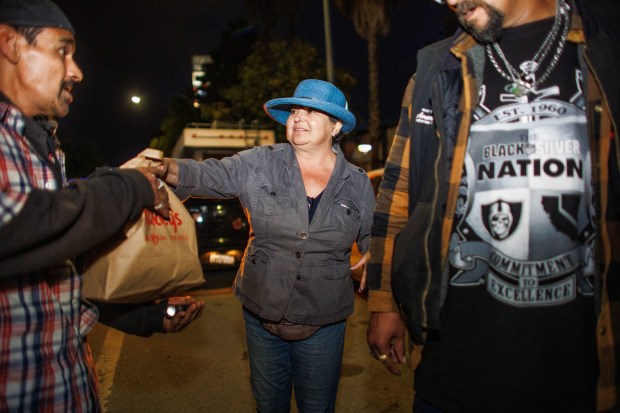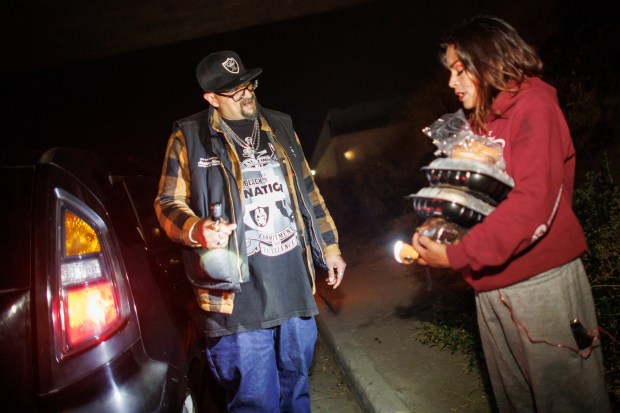GILROYOn a recent dark, cloudy night, Sam “Pit” Brown and Jan Bernstein Chargin drove through the streets of Gilroy, trunks full of dozens of hot meals tucked away in insulated bags.
They stopped by a roadside to hand out food before pulling up to an unlit underpass. Big rigs zoomed by, illuminating the RVs and trucks clustered into a loose encampment below. Then Bernstein Chargin honked her horn and shouted, “Hello, It’s Jan! I got dinner!”
That’s the sound of a meal call for PitStop Outreach, the nonprofit that Brown co-founded with Bernstein Chargin. Every weekday, Brown and a small force of helpers deliver as many as 150 hot meals a night, offering much-needed supplies and assistance to the homeless residents of Gilroy.
“Our mission is to be there for people on the street while they’re trying to survive — while they’re going through their housing process, while they’re trying to deal with the day-to-day,” said Bernstein Chargin.
PitStop first took shape in early 2020, as the effects of the COVID-19 pandemic ground many services to a halt. While the soup kitchens that helped feed people in Gilroy shut down, the need for them stayed the same.
“Me and Jan were like, ‘Something’s gotta be done, people out there are starving,’” said Brown. “When the pandemic started, we were on the front lines the first week.”
Soon, they partnered with Martha’s Kitchen, a San Jose soup kitchen, and then trained in food handling so they could hand out meals directly to the residents who needed them. Together, they set up sanitation stations, handed out masks and hand sanitizers, aided with clean-ups, and gathered tent donations so that individuals could quarantine and shelter in place.
Initially, they packed meals in churches and community centers, but now, they have a permanent space with a sign outside displaying PitStop’s logo: a pitbull with a bright red heart.
PitStop is seeking donations through Wish Book to help them pay rent and utilities to run its site and aid them in providing stipends to give volunteers and homeless individuals a chance to earn money while they seek permanent housing or employment.

Both the logo and the name came from Brown’s nickname, “Pit” — short for “Pitbull,” which his mother gave him as a child. But before Brown became the co-founder of a nonprofit that shared his name, he faced his own share of difficulties.
As Brown tells it, he came from a “broken” home and faced incarceration and homelessness.
His experiences helped give him an understanding of the community that he now serves: Brown aims to reserve judgment and see his companions as whole people with dreams and desires. “We see the people for who they are and what they are,” he said.
For Bernstein Chargin, that mindset is crucial. “I went through a period of homelessness in my 20s, and the hardest thing is to not feel judged,” she said. “To not feel like you’re not good enough.”

For four years, she found shelter in a warehouse. She remembers the winters especially, and the experience helped motivate her to help others find shelter and support. “I don’t ever really want to forget what it’s like to be cold,” she said.
In Brown’s case, his experiences inform how he serves every meal. He recalls going to certain soup kitchens and eating “slop,” so he tells his volunteers to put care into every plate. “It’s not just food on a plate,” said Brown. “I tell them to treat it like they’re eating it themselves, or feeding family members.”
Brown said he wasn’t always this way. Though his mother served homeless populations throughout his life and he would volunteer at times “to stay busy,” he said he had little interest in following in her footsteps. “To be honest with you, before I got fully wrapped up in it, I didn’t even like people,” he said. “This is not something I ever wanted to do or make a career out of.”
But when his mother died in 2019, the work was a way to “keep her legacy and her memory alive,” he said. Now he calls his mother “the beating heart of PitStop.”
“PitStop has been a whole life changer for myself,” said Brown. “When I help or a give a person a hot meal, and (see) the gratitude that they get — it gives me that feeling that my mom’s still looking down on me today,” said Brown.
Now, PitStop — run entirely by volunteers — serves as a lifeline to many on the streets who might not otherwise have food.

Back beneath the underpass, Brown offers a meal to Teresa Duarte, a distant cousin who lives there. Duarte worked for 12 years as a hospice care provider before losing her job, and then her housing. She has lived in the same place for five years, and said that living on the streets has been hard “especially for a female.”
But people like Brown help lighten the load. “I’m grateful that the food is coming,” said Duarte. “There’s days where I wasn’t able to eat, because of not having people like him. So he’s good.”
Later in the evening, Brown and Bernstein Chargin move on to a cluster of RVs parked on the side of a road. There, they meet with Elvera Muñoz, who has been homeless in Gilroy for six years.
She has had to move “all the time,” dodging encampment sweeps across town, she said. Through it all, Brown and Bernstein Chargin have helped people like Muñoz tow RVs to new locations, and with packing and cleaning encampments when sweeps are ordered. When camps flooded due to the atmospheric river last winter, Brown was out in the middle of the night in waders to relocate tents and vehicles.
“Everyone else just tries to kick us away,” said Muñoz. But Brown and PitStop have been a consistent supportive presence — when she needs tarps, or blankets, or water, she knows that she can call Brown, she said. “He’s always around, so when we need him, he’s out here.”

THE WISH BOOK SERIES
Wish Book is a 501(c)(3) nonprofit organization operated by The Mercury News. Since 1983, Wish Book has been producing series of stories during the holiday season that highlight the wishes of those in need and invite readers to help fulfill them.
WISH
Donations will help PitStop Outreach pay rent and utilities to run its site and aid them in providing stipends to give volunteers and homeless individuals a chance to earn money while they seek permanent housing or employment. Goal: $15,000
HOW TO GIVE
Donate at wishbook.mercurynews.com/donate or mail in this form.
ONLINE EXTRA
Read other Wish Book stories, view photos and video at wishbook.mercurynews.com
Source: www.mercurynews.com
